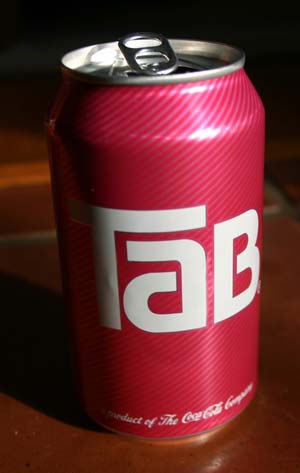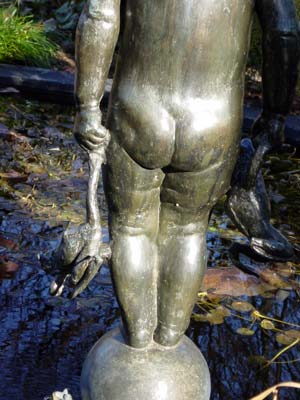Musings

The They we call They with a capital T have decided to market Tab in a new way (ha, no, not really new; they’re just doing that Coke Classic marketing game). Long-time Tab aficionados like my husband are displeased that their drink is being altered to serve the gods of the bottom line.
Recently, John found a retro t-shirt with the Tab logo on the front, and being a logo guy, bought it. The first time I went anywhere with him when he was wearing it, in about an hour in two shops, three different people came up to him to rave about Tab and complain about the corporate effects on the drink.
Let’s see if Coke’s marketing people figure out that they have some loyal customers who are mighty unhappy. I guess, however, this will only happen if the customers they’re trying to attract don’t start buying the new travesty version of Tab.
Posted at 2:51 PM |
Comments Off on Tab today

Yellow rose, not of Texas.
While suturing a cut on the hand of a 75-year old Texas rancher the doctor and the old man struck up a conversation about George W. Bush being in the White House. The old Texan said, “Well, ya know, Bush is a ‘post turtle'”.
Not being familiar with the term, the doctor asked him what a ‘post turtle’ was.
The old rancher said, “When you’re driving down a country road and you come across a fence post with a turtle balanced on top—that’s a post turtle.”
The old man saw a puzzled look on the doctor’s face, so he continued to explain, “You know he didn’t get there by himself, he doesn’t belong there, he doesn’t know what to do while he’s up there, and you just want to help the dumb bastard get down!”
P.S. Thanks to Kelley.
Posted at 5:08 PM |
Comments Off on Post turtle

Maize: very indehiscent.
STEM = science, technology, engineering, and mathematics
Wanna be a high school science teacher? Have the chops for it? Then you are in increasing demand—a demand greater than for college professors. Click here for discussion by Jo Anne Vasquez of the National Science Board.
Did I have a high school science teacher who strongly influenced me, which Vazquez says is common? Maybe Bill Campbell, the smoking non-smoking advocating biology teacher….
Trivia about Mason High: Malcolm X went there. The son of one of Malcolm’s buddies, who he mentioned in his autobiography, was in my class, but even so, we didn’t talk much about Malcolm. Sports was the strong suit at Mason, not history….
Today’s vocabulary: indehiscent. Means resistent to shattering, and is applied to changes in grains, e.g., wheat, in the process of domestication. Seed heads that retain the grain make it easier to harvest efficiently, yet the plant is less successful at reproducing itself because unharvested seeds would not disperse far from the parent.
Connection between STEM and “indehiscent”? Your call!
Posted at 4:16 PM |
Comments Off on STEM

Late summer Ohio soybeans.
New one on me! Proponents of the carbohydrate economy argue for basing our material culture on plants, plants transformed into textiles, chemicals, and, especially, energy.
Pardon me, but isn’t petroleum plants? Transformed plants, but plants nonetheless…. Ironic….
The American Prospect’s new article by David Morris, “The Once and Future Carbohydrate Economy,” discusses how this movement will revive farms and farming, and redistribute the locus of production across the landscape—at least those parts of it that can make big agricultural contributions. The biggest selling point for the carbohydrate economy, as near as I can tell, is that it is sustainable, first and foremost, and second, that it will reduce pollution.
However, I think this ignores the huge petrochemical inputs to modern, monocropped, high-production agriculture, which the carbohydrate economy would have to be based on to meet production demands, not only in the field, but in getting the goods to market or factory, and transforming them into those touted carbohydrate economy products.
Can you really buy Morris’s optimistic prediction?
The carbohydrate economy has the worldwide potential to catalyze a cooperative farmer movement that displaces the traditional farmer-versus-farmer battles. Traditionally, the carbohydrate has battled other carbohydrates for market share. High-fructose corn sugar versus sugar cane. Brazilian soybeans versus U.S. soybeans. In the future, producers of carbohydrates can cooperate to capture another huge, untapped market: hydrocarbons.
Mark me unconvinced. You?
BTW, if we adopt the CE, we better figure out how to get all those Latin American illegals integrated into our labor system! We’re gonna need ’em!
Posted at 6:11 PM |
Comments Off on Carbohydrate economy

“Frog-baby” at ABG.
Whale meat is not something I normally ponder. However, I encountered Nancy Shoemaker’s article “Whale Meat in American History“—posted for free by the History Cooperative—and, voila!, for a moment I do ponder it….
Dr. Shoemaker points out that while whales play an notable role in American history (think Yankee whalers, whalebone stays, pre-petroleum whale-oil trade), we don’t do much with them any more (a bit of research, a few killed by Native Americans).
I think Shoemaker goes a bit off track when discussing the cultural complexities of taste and palate (we’re a nation who doesn’t eat whales, and core American culture considers them basically not-food, while the Japanese and others do eat them). This is the land of anthropology, a terrain sometimes poorly understood by historians.
Over the past several hundred years, especially in the past three decades, the whale-eating divide has emerged as a tense global struggle—one that cannot be understood within the existing interpretive frameworks typically applied to post-Columbian world history. (p.6)
Shoemaker’s greater error, though, is to argue that whale management and the International Whaling Commission are such a key part of global ecology dialogue. Overall, I think Shoemaker’s connection between US cultural attitudes toward whales and global policy conflicts is overblown—whales are only a weak factor in either global ecology or international differences of opinion.
Posted at 5:16 PM |
Comments Off on Whale meat

How many times do you eat chicken each week? The NY Times says that while in 1960 the average annual per capita US consumption was 28 lbs, now it’s up to 87 lbs. It’s cheap, so why not?
Here’s why: many commercial chickens eat feed with arsenic in it, to control parasites. And that poison is passed on to you!
Fortunately, antibiotic-free chickens haven’t consumed arsenic. Plus, Tyson Foods chickens haven’t been fed it. However, assume fast-food chicken has it, although not all does. And the skin has far higher arsenic levels than the meat.
BTW, try the Chicken Dijon recipe I just added over in the “Food fun” section. Gee, I wonder how much arsenic is in turkey….
On another note, I can’t help thinking the timing of DeLay’s announcement that he’s resigning, now, after a recent primary win, is all about DeLay’s own interests, and none about doing the best for his constituents or the public in general (interesting Washington Post article on this issue). Big thumb’s down. Question: is this the kind of ethics that other Christian fundamentalists espouse?
Speaking of self-serving behavior, IRS data shows that indeed Bush’s tax cut on investments has padded the wallets of the rich, according to the NY Times. Note that “Among taxpayers with incomes greater than $10 million…whose average income was $26 million, paid about the same share of their income in income taxes as those making $200,000 to $500,000 because of the lowered rates on investment income.” In another story, the NY Times reports that “Most Americans have taken a pay cut since 2002.”
The picture is not pretty.
Posted at 9:43 PM |
Comments Off on Arsenic chicken

I have airborne evidence that the Masters Golf Tournament is nearly upon us. At least I think so!
On the ground, Piedmont Park was a hotbed of activity late this afternoon. The kite flyers were having the most fun, followed by the young teen boys throwing footballs, and lots of people were walking dogs and airing their iPods.
Me, I had the GPS (5 1/3 miles at 3.7 mph average) and the camera….
Posted at 8:51 PM |
Comments Off on Blimps & kites

The cars were parked nose in to the curb, the way they do in towns, and never do in cities.
Robert B. Parker, in Paper Doll (1993, p. 58). You know, he’s right. I can’t think of a City with angle parking. Not that I’ve been everywhere, but.
Even in London, Paris: no angle parking. Small-town England, yes, but not London, Bath.
Don’t know about Australia, Asia, Amazonia….
Posted at 10:22 PM |
Comments Off on Parking paradigm

Yesterday, Apple turned thirty.
Long live Apple!
Posted at 10:22 PM |
Comments Off on Apple’s birthday

Today, we enjoyed a gorgeous spring day, with temps tipping toward summer, but vegetation solidly in spring. We had the additional fortune of spending much of the day with our friends Kay and Dean wandering around Callaway Gardens. While we certainly reveled in the blooms—especially the banks of azaleas and dogwoods scattered below the pines—we also spent considerable time watching languid koi, bream (HUGE “brim”!), and sunning turtles.
John, perhaps a bit gleefully and perhaps a bit disgustedly, pointed out several egregious misspellings in Callaway’s carefully made signs, e.g., restauraunt, bicyles (we speculated that the pronunciation was “bickles”), and their inconsistent use of typefaces.
Posted at 6:35 PM |
Comments Off on Summery spring









